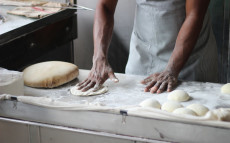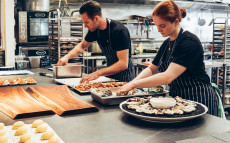- pathfindersAI
- Job Profile
Chefs and Head Cooks
Summary
Chefs and Head Cooks: Crafting Culinary Excellence
What They Do
Chefs and Head Cooks are the masterminds behind the culinary magic that graces dining tables across the globe. These culinary artists are responsible for creating, designing, and orchestrating a symphony of flavors that delight the taste buds of their patrons. They work in a variety of settings, from high-end gourmet restaurants and hotels to casual dining eateries and institutional kitchens. Chefs and Head Cooks blend a deep understanding of food science with an artistic flair, showcasing their creativity through the innovative dishes they prepare.
Job Responsibilities
The role of a Chef or Head Cook encompasses a spectrum of responsibilities that ensure the efficient operation of the kitchen. At the core, they plan and direct food preparation in the kitchen. This includes supervising kitchen staff, selecting fresh ingredients, preparing and cooking food, and ensuring that every dish meets the quality standards of the establishment. Additionally, they create menus, manage inventory and supplies, and maintain sanitation standards. A Head Cook, in particular, is often involved in the business side of things, such as budgeting, negotiating with suppliers, and overseeing the financial aspects of the kitchen.
Essential Skills
To excel in this demanding yet rewarding profession, several essential skills are imperative. First and foremost, chefs and head cooks must have exceptional culinary skills, including a deep understanding of cooking techniques, flavor profiles, and presentation. Leadership and management skills are also critical, as they must lead and inspire their kitchen brigade. Attention to detail ensures that each dish meets the highest standards. Moreover, time management is essential in handling the fast-paced environment of a professional kitchen. Creativity and innovation enable chefs to continually push the boundaries of gastronomy, while excellent communication skills facilitate seamless coordination within the kitchen team.
Educational Pathways
The journey to becoming a Chef or Head Cook can follow various educational pathways. Many aspiring chefs start their careers by pursuing formal education in culinary arts. State colleges often offer a range of programs, from certificate courses to associate and bachelor's degree programs. These programs provide comprehensive training in culinary techniques, kitchen management, nutrition, and food safety. Hands-on experience through internships and apprenticeships is invaluable, often available in partnership with local restaurants and hotels. For those aiming for the pinnacle of the profession, further education and specialization in areas such as pastry arts or international cuisines can be pursued through advanced culinary programs.
Career Prospects
The career prospects for Chefs and Head Cooks are broad and varied, reflecting the diverse nature of the culinary industry. Entry-level positions, such as line cooks or sous chefs, provide foundational experience. With dedication and experience, professionals can advance to the role of Head Cook or Executive Chef, overseeing entire kitchens in prestigious establishments. Beyond traditional settings, opportunities exist in catering companies, private households, and even food trucks. Moreover, a growing interest in cooking shows, food blogs, and culinary innovation offers unique pathways in media and entrepreneurship. The Bureau of Labor Statistics projects a steady demand for chefs, highlighting a positive outlook for those entering the field.
Conclusion
In conclusion, the role of Chefs and Head Cooks is pivotal in shaping the culinary experiences that enrich our lives. Combining technical expertise, creativity, and leadership, these professionals create memorable dining moments. The career offers a range of opportunities for growth and innovation, underpinned by a solid educational foundation. For those with a passion for food and an unwavering commitment to excellence, a career as a Chef or Head Cook promises not only personal fulfillment but also the chance to leave a lasting mark on the world of gastronomy. As the culinary landscape continues to evolve, the contributions of these culinary wizards will undoubtedly remain indispensable.
Video
Compensation
| State | Median Salary | Median Hourly | Positions |
|---|---|---|---|
| AL | 58,240 | 28.00 | 790 |
| AK | 60,250 | 28.97 | 570 |
| AZ | 64,560 | 31.04 | 2,580 |
| AR | 46,380 | 22.30 | 1,060 |
| CA | 60,930 | 29.29 | 27,460 |
| CO | 63,470 | 30.51 | 4,170 |
| CT | 60,570 | 29.12 | 3,490 |
| DE | 51,550 | 24.78 | 560 |
| DC | 69,410 | 33.37 | 1,770 |
| FL | 56,910 | 27.36 | 14,910 |
| GA | 52,230 | 25.11 | 4,560 |
| HI | 94,030 | 45.21 | 580 |
| ID | 45,600 | 21.92 | 530 |
| IL | 61,420 | 29.53 | 7,650 |
| IN | 51,440 | 24.73 | 1,420 |
| IA | 41,790 | 20.09 | 1,570 |
| KS | 53,760 | 25.85 | 1,260 |
| KY | 36,770 | 17.68 | 2,050 |
| LA | 45,100 | 21.69 | 1,760 |
| ME | 58,490 | 28.12 | 1,030 |
| MD | 63,550 | 30.55 | 2,730 |
| MA | 75,770 | 36.43 | 4,470 |
| MI | 56,630 | 27.23 | 4,520 |
| MN | 57,440 | 27.61 | 2,110 |
| MS | 49,550 | 23.82 | 700 |
| MO | 54,230 | 26.07 | 2,010 |
| MT | 48,890 | 23.50 | 530 |
| NE | 51,940 | 24.97 | 730 |
| NV | 52,980 | 25.47 | 3,900 |
| NH | 56,040 | 26.94 | 1,180 |
| NJ | 65,000 | 31.25 | 6,350 |
| NM | 63,440 | 30.50 | 300 |
| NY | 62,750 | 30.17 | 13,670 |
| NC | 57,940 | 27.86 | 3,310 |
| ND | 75,400 | 36.25 | 120 |
| OH | 47,980 | 23.07 | 4,480 |
| OK | 33,090 | 15.91 | 1,490 |
| OR | 56,900 | 27.36 | 2,740 |
| PA | 60,200 | 28.94 | 5,320 |
| RI | 75,590 | 36.34 | 500 |
| SC | 52,500 | 25.24 | 2,120 |
| SD | 46,260 | 22.24 | 160 |
| TN | 55,650 | 26.75 | 2,150 |
| TX | 48,560 | 23.35 | 13,670 |
| UT | 49,450 | 23.78 | 1,510 |
| VT | 61,240 | 29.44 | 770 |
| VA | 49,660 | 23.87 | 3,890 |
| WA | 67,140 | 32.28 | 4,470 |
| WV | 55,180 | 26.53 | 330 |
| WI | 59,160 | 28.44 | 2,050 |
| WY | 62,220 | 29.92 | 300 |
Similar Occupations
In this area you will find other occupations that are close to the one you were viewing in tasks, knowledge and work environment. If the primary job profile you are viewing isn't quite to your liking, take a look around and see what else is available.
Basic and Premium Accounts have more alternative occupations available than the Free account.

Bakers - 51-3011.00
A baker prepares and bakes various types of breads, pastries, and other baked goods by mixing ingredients, kneading dough, and monitoring baking times and temperatures. They often work early hours to ensure fresh products are available for customers each day.
-
$34,950/yr
Median Pay -
220,230
Number of Jobs

Cooks, Institution and Cafeteria - 35-2012.00
Cooks in institutions and cafeterias are responsible for preparing large quantities of meals according to set menus, dietary guidelines, and food safety standards. They ensure that food is cooked, stored, and served properly while maintaining a clean and organized workspace to provide nutritious and palatable meals to patrons.
-
$35,320/yr
Median Pay -
435,640
Number of Jobs